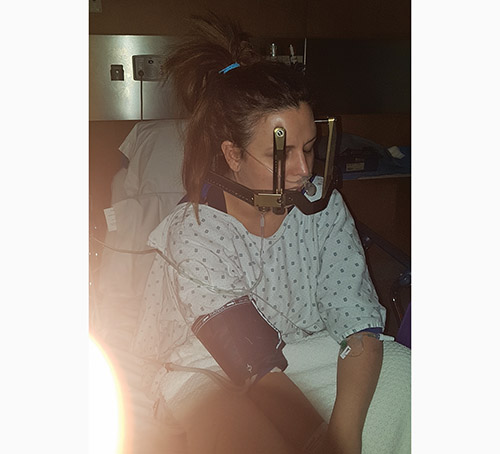
Aliza Meshulam and her husband, Yiftach, from Ashdod, have been living in the home of a generous family in Edison since November. Her plight has come to light by the advocacy of a group of caring women from the community who have been cooking meals for the couple these past eight months. Through their connection as teachers at Yeshivat Noam, Rachel Levy, Iris Aharon and Ilana Hen have been preparing and coordinating meals for the couple as they seek medical help in the U.S.
Aliza, now 38, has been afflicted with Eagle Syndrome, an extremely rare disease, since the age of 32. Its prognosis and cure elude some of the most sophisticated medical minds worldwide. When Aliza was diagnosed with Eagle Syndrome, she and her husband lived in Ashdod with their son and daughter, and they owned a business. The disease, caused by a bone spur formed at the base of the neck that works its way up to the brain and causes havoc with the surrounding nerves, debilitated the young mother. The couple sought out medical help in Israel but were unable to get proper treatment for the rare disease. They were initially directed to Belgium for surgery and followed up in Israel with many alternative medical procedures, but to no avail.
Aliza and Yiftach were then advised to seek out medical help in the U.S. This past November they were forced to leave their children, a son, 18, who will shortly be joining Tzahal, and a daughter, 17, who will be serving in Sherut Leumi, and come to America seek treatment. After unsuccessful treatments in Pittsburgh and Virginia, the Meshulams are currently living in Edison, but they are now without any income as they face mounting medical expenses. Yiftach was forced to close up his appliance store in Ashdod to accompany his wife and remain at her side throughout her treatments. Both of Aliza’s parents were recently deceased, so there is minimal family assistance available.
Two months ago, Aliza underwent a major operation at NYU Medical Center. The “gannonite procedure” served to numb one of the painful nerves but only for a finite period of up to 2 years. Aliza, whose excruciating pain can be controlled only by morphine and medical cannabis, must follow up the surgery with private therapies, each costing approximately $12,000. Several more therapies are needed before the Meshulams can return to Israel.
Yiftach, who is trying to hold up under intense pressures, recalls their happier times when he and Aliza spearheaded their own personal gemach that provided weekly Shabbat meals for 24 poor families in Ashdod. He is saddened when he remembers Aliza’s successful career as a medical secretary.
The Meshulams are in need of our community’s help to pay for treatments past and going forward and to help defray the expenses they have accumulated throughout Aliza’s illness. They are estimating conservatively that they will need approximately $120,000 to help them get back to Israel.
The women who have been assisting the family ask that the greater community consider helping Aliza and Yiftach and their children return to a functioning and productive life in Israel. Donations should be sent to Chabad of Tenafly at www.chabadLubavitch.org/Helpaliza.
In appreciation of any donation, Yiftach asks that individuals enter their Hebrew names in the comments field and he will arrange for the recitation of Tehillim for individuals and their loved ones by an organization of 60 youngsters in Ashdod who recite Tehillim daily for all cholim.
By Pearl Markovitz











